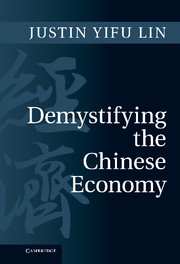Book contents
- Frontmatter
- Contents
- List of figures
- List of tables
- Preface
- 1 Opportunities and challenges in China's economic development
- 2 Why the Scientfic and Industrial Revolutions bypassed China
- 3 The great humiliation and the Socialist Revolution
- 4 The comparative advantage-defying, catching-up strategy and the traditional economic system
- 5 Enterprise viability and factor endowments
- 6 The comparative advantage-following development strategy
- 7 Rural reform and the three rural issues
- 8 Urban reform and the remaining issues
- 9 Reforming the state-owned enterprises
- 10 The financial reforms
- 11 Deflationary expansion and building a new socialist countryside
- 12 Improving the market system and promoting fairness and efficiency for harmonious development
- 13 Relflections on neoclassical theories
- Appendix Global imbalances, reserve currency, and global economic governance
- Index
3 - The great humiliation and the Socialist Revolution
Published online by Cambridge University Press: 05 June 2014
- Frontmatter
- Contents
- List of figures
- List of tables
- Preface
- 1 Opportunities and challenges in China's economic development
- 2 Why the Scientfic and Industrial Revolutions bypassed China
- 3 The great humiliation and the Socialist Revolution
- 4 The comparative advantage-defying, catching-up strategy and the traditional economic system
- 5 Enterprise viability and factor endowments
- 6 The comparative advantage-following development strategy
- 7 Rural reform and the three rural issues
- 8 Urban reform and the remaining issues
- 9 Reforming the state-owned enterprises
- 10 The financial reforms
- 11 Deflationary expansion and building a new socialist countryside
- 12 Improving the market system and promoting fairness and efficiency for harmonious development
- 13 Relflections on neoclassical theories
- Appendix Global imbalances, reserve currency, and global economic governance
- Index
Summary
China was regarded as a great power until the end of the seventeenth century. But by the mid-nineteenth century it was a backward agrarian country. Europe caught up with China, not because of higher productivity but because of the discovery of the New World, which brought piles of gold and silver to Europe. The new wealth dramatically enhanced living standards there. When the Industrial Revolution started in the eighteenth century, technological innovation accelerated in Europe, soon leaving China behind, and the gap continued to widen.
Beginning a history of humiliation
China's per capita income in 1820 was 523 international monetary units, much less than the 1, 287 for the United States and 1, 756 (then highest) for the United Kingdom. In 1950 China's per capita income was 614, a small fraction of the 9, 573 (then highest) for the United States and 6, 847 for the United Kingdom. So China's per capita income had fallen to one-fifteenth of that of the United States and one-tenth of the United Kingdom.
China's position in international politics also plummeted. Before the mid-Qing Dynasty (1644–1911) China was still the most powerful country in the world and the suzerain of its neighboring countries, which paid it tribute. When Great Britain first dispatched its envoys to China, China gave it a pejorative name suggesting that it was a country of barbarians with no respect for protocols. But less than a century after the Industrial Revolution, China was soundly defeated by Britain in the Opium War of 1840. After that it was successively defeated by France, Japan, and the Eight-Power Allied Forces, inflicting unspeakable injury and insult.
- Type
- Chapter
- Information
- Demystifying the Chinese Economy , pp. 55 - 73Publisher: Cambridge University PressPrint publication year: 2011



